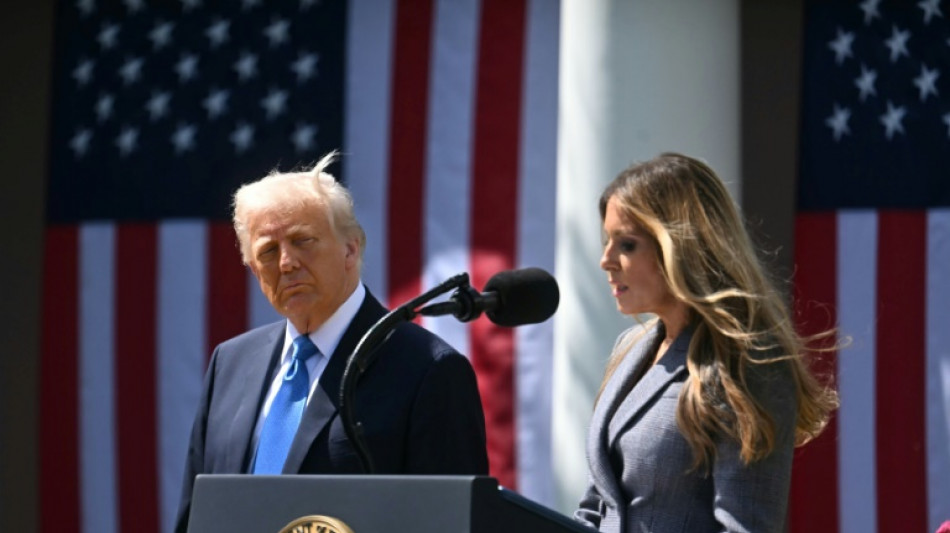
-
 OpenAI signs multi-billion dollar chip deal with AMD
OpenAI signs multi-billion dollar chip deal with AMD
-
Salah under fire as Liverpool star loses his spark

-
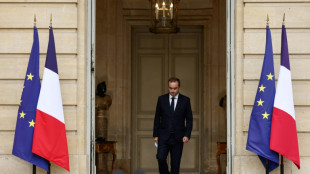 Paris stocks drop as French PM resigns, Tokyo soars
Paris stocks drop as French PM resigns, Tokyo soars
-
ICC finds Sudan militia chief guilty of crimes against humanity
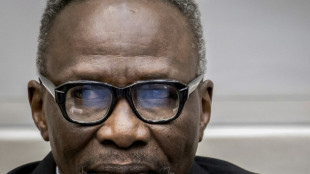
-
 Zverev dumped out of Shanghai Masters by France's Rinderknech
Zverev dumped out of Shanghai Masters by France's Rinderknech
-
One hiker dead, hundreds rescued after heavy snowfall in China

-
 Hundreds stage fresh anti-government protests in Madagascar
Hundreds stage fresh anti-government protests in Madagascar
-
Feminist icon Gisele Pelicot back in court as man appeals rape conviction

-
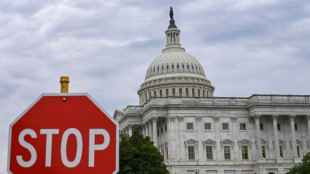 US government shutdown enters second week
US government shutdown enters second week
-
Kasatkina ends WTA season early after hitting 'breaking point'

-
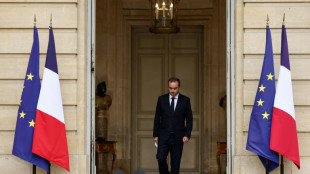 Paris stocks drop as French PM resigns
Paris stocks drop as French PM resigns
-
Death toll from Indonesia school collapse rises to 63

-
 Medicine Nobel to trio who identified immune system's 'security guards'
Medicine Nobel to trio who identified immune system's 'security guards'
-
UN rights council launches probe into violations in Afghanistan

-
 UK author Jilly Cooper dies aged 88
UK author Jilly Cooper dies aged 88
-
Jilly Cooper: Britain's queen of the 'bonkbuster' novel

-
 Streaming stars' Le Mans race scores Twitch viewer record
Streaming stars' Le Mans race scores Twitch viewer record
-
England rugby star Moody 'shocked' by motor neurone disease diagnosis

-
 Leopard captured after wandering into Indonesian hotel
Leopard captured after wandering into Indonesian hotel
-
Israel, Hamas due in Egypt for ceasefire talks

-
 Rescuers scramble to deliver aid after deadly Nepal, India floods
Rescuers scramble to deliver aid after deadly Nepal, India floods
-
Tokyo stocks soar on Takaichi win, Paris sinks as French PM resigns

-
 OpenAI offers more copyright control for Sora 2 videos
OpenAI offers more copyright control for Sora 2 videos
-
Australia prosecutors appeal 'inadequate' sentence for mushroom murderer: media

-
 Rugby World Cup-winning England star Moody has motor neurone disease
Rugby World Cup-winning England star Moody has motor neurone disease
-
Trump says White House to host UFC fight on his 80th birthday

-
 Vast reserves, but little to drink: Tajikistan's water struggles
Vast reserves, but little to drink: Tajikistan's water struggles
-
US government shutdown may last weeks, analysts warn
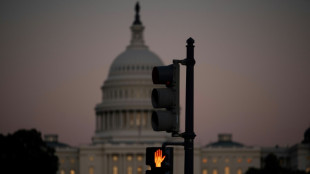
-
 Arsenal host Lyon to start new Women's Champions League format
Arsenal host Lyon to start new Women's Champions League format
-
Gloves off, Red run, vested interests: Singapore GP talking points

-
 Bills, Eagles lose unbeaten records in day of upsets
Bills, Eagles lose unbeaten records in day of upsets
-
Muller on target as Vancouver thrash San Jose to go joint top

-
 Tokyo soars, yen sinks after Takaichi win on mixed day for Asia
Tokyo soars, yen sinks after Takaichi win on mixed day for Asia
-
China's chip challenge: the race to match US tech

-
 UN rights council to decide on creating Afghanistan probe
UN rights council to decide on creating Afghanistan probe
-
Indonesia sense World Cup chance as Asian qualifying reaches climax

-
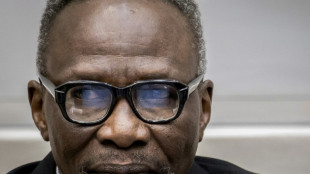 ICC to give war crimes verdict on Sudan militia chief
ICC to give war crimes verdict on Sudan militia chief
-
Matthieu Blazy to step out as Coco's heir in Chanel debut

-
 Only man to appeal in Gisele Pelicot case says not a 'rapist'
Only man to appeal in Gisele Pelicot case says not a 'rapist'
-
Appetite-regulating hormones in focus as first Nobel Prizes fall

-
 Gisele Pelicot: French rape survivor and global icon
Gisele Pelicot: French rape survivor and global icon
-
Negotiators due in Egypt for Gaza talks as Trump urges quick action

-
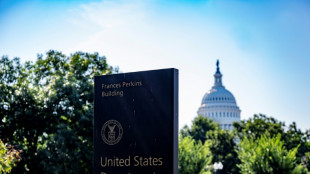 'My heart sank': Surging scams roil US job hunters
'My heart sank': Surging scams roil US job hunters
-
Competition heats up to challenge Nvidia's AI chip dominance

-
 UK police to get greater powers to restrict demos
UK police to get greater powers to restrict demos
-
Global Tech Pioneers CZ and Co-Founder of Shazam to Headline FinTech Forward 2025 in Bahrain

-
 Guerrero grand slam fuels Blue Jays in 13-7 rout of Yankees
Guerrero grand slam fuels Blue Jays in 13-7 rout of Yankees
-
Five-try Bayonne stun champions Toulouse to go top in France

-
 Fisk reels in Higgo to win maiden PGA Tour title in Mississippi
Fisk reels in Higgo to win maiden PGA Tour title in Mississippi
-
Aces overpower Mercury for 2-0 lead in WNBA Finals

| NGG | -0.03% | 73.41 | $ | |
| SCS | -0.44% | 17.035 | $ | |
| BCC | -1.5% | 76.48 | $ | |
| JRI | -0.46% | 14.235 | $ | |
| GSK | 1.06% | 43.815 | $ | |
| RELX | 0.26% | 46.53 | $ | |
| RIO | 1.68% | 67.24 | $ | |
| CMSD | -0.58% | 24.31 | $ | |
| BCE | -0.91% | 23.15 | $ | |
| RYCEF | -0.06% | 15.75 | $ | |
| BTI | -0.45% | 51.01 | $ | |
| BP | 2.46% | 35.02 | $ | |
| AZN | 0.86% | 86.05 | $ | |
| VOD | -0.49% | 11.305 | $ | |
| RBGPF | -2.92% | 76 | $ | |
| CMSC | -0.32% | 23.795 | $ |

Trump signs bill outlawing 'revenge porn'
US President Donald Trump signed a bill on Monday making it a federal crime to post "revenge porn" -- whether it is real or generated by artificial intelligence.
The "Take It Down Act," passed with overwhelming bipartisan congressional support, criminalizes non-consensual publication of intimate images, while also mandating their removal from online platforms.
"With the rise of AI image generation, countless women have been harassed with deepfakes and other explicit images distributed against their will," Trump said at a signing ceremony in the Rose Garden of the White House.
"And today we're making it totally illegal," the president said. "Anyone who intentionally distributes explicit images without the subject's consent will face up to three years in prison."
First Lady Melania Trump endorsed the bill in early March and attended the signing ceremony in a rare public White House appearance.
The First Lady has largely been an elusive figure at the White House since her husband took the oath of office on January 20, spending only limited time in Washington.
In remarks at the signing ceremony, she described the bill as a "national victory that will help parents and families protect children from online exploitation."
"This legislation is a powerful step forward in our efforts to ensure that every American, especially young people, can feel better protected from their image or identity being abused," she said.
Deepfakes often rely on artificial intelligence and other tools to create realistic-looking fake videos.
They can be used to create falsified pornographic images of real women, which are then published without their consent and proliferate.
Some US states, including California and Florida, have laws criminalizing the publication of sexually explicit deepfakes, but critics have voiced concerns the "Take It Down Act" grants the authorities increased censorship power.
The Electronic Frontier Foundation, a nonprofit focused on free expression, has said the bill gives "the powerful a dangerous new route to manipulate platforms into removing lawful speech that they simply don't like."
The bill would require social media platforms and websites to have procedures in place to swiftly remove non-consensual intimate imagery upon notification from a victim.
- Harassment, bullying, blackmail -
An online boom in non-consensual deepfakes is currently outpacing efforts to regulate the technology around the world due to a proliferation of AI tools, including photo apps digitally undressing women.
While high-profile politicians and celebrities, including singer Taylor Swift, have been victims of deepfake porn, experts say women not in the public eye are equally vulnerable.
A wave of AI porn scandals have been reported at schools across US states with hundreds of teenagers targeted by their own classmates.
Such non-consensual imagery can lead to harassment, bullying or blackmail, sometimes causing devastating mental health consequences, experts warn.
Renee Cummings, an AI and data ethicist and criminologist at the University of Virginia, said the bill is a "significant step" in addressing the exploitation of AI-generated deepfakes and non-consensual imagery.
"Its effectiveness will depend on swift and sure enforcement, severe punishment for perpetrators and real-time adaptability to emerging digital threats," Cummings told AFP.
T.Egger--VB
